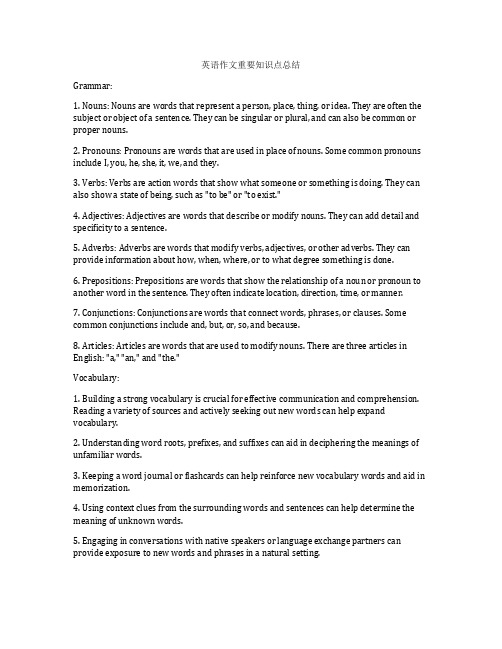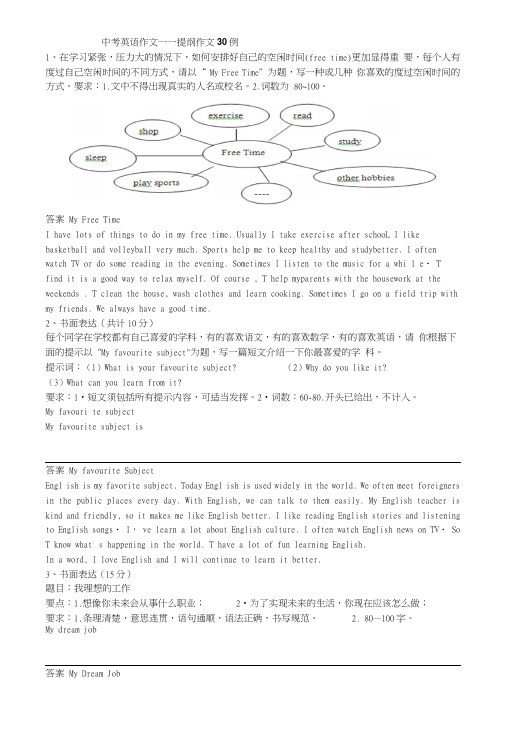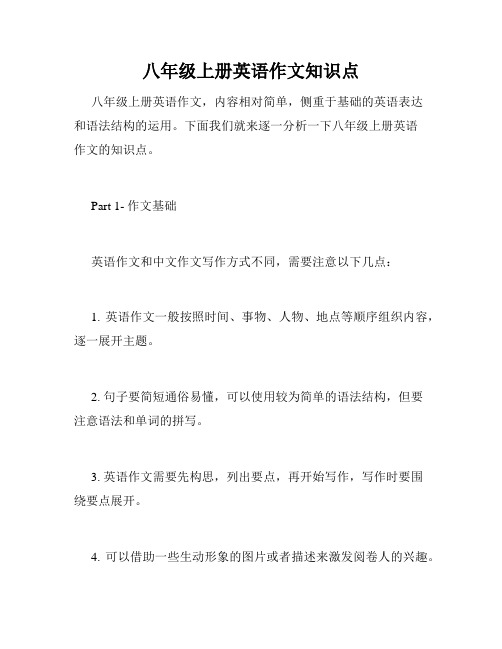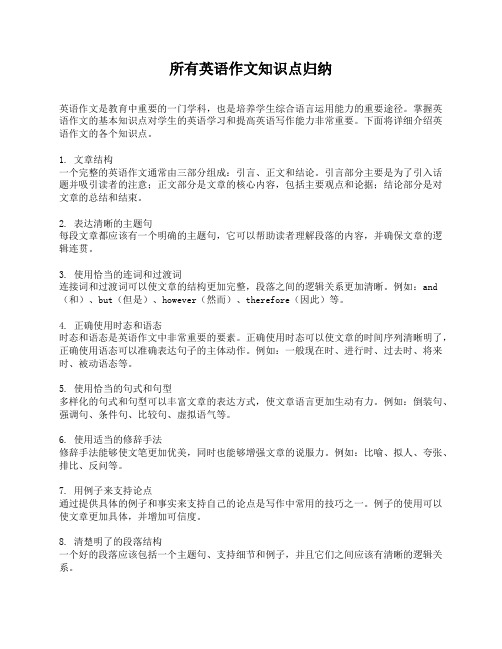初中英语作文实用简要知识点
高分英语作文2025年写作知识点汇总

高分英语作文2025年写作知识点汇总在 2025 年,英语写作的要求和重点可能会有所变化,但一些核心的知识点始终是取得高分的关键。
以下是为大家汇总的重要写作知识点,希望能对大家的英语写作水平提升有所帮助。
一、词汇运用拥有丰富的词汇量是写好英语作文的基础。
但仅仅记住单词的拼写和意思还不够,更要懂得如何准确运用。
1、避免重复使用常见词汇例如,在表达“重要”这个意思时,不要总是用“important”,可以交替使用“significant”“crucial”“vital”等。
这能让作文语言更丰富,展现出你的词汇积累。
2、注意词汇的搭配不同的单词在搭配上有特定的习惯,比如“make a decision”(做决定)而不是“do a decision”。
3、学习使用高级词汇但要确保对其含义和用法有清晰的理解,避免用错。
比如“phenomenon”(现象)比“thing”更正式和准确。
二、语法正确语法是英语写作的骨架,错误的语法会让作文大打折扣。
1、时态的正确使用根据文章描述的时间和情境,选择合适的时态。
比如叙述过去的经历用过去时,阐述普遍真理用一般现在时。
2、主谓一致确保主语和谓语在人称和数上保持一致,这是常见但容易出错的地方。
3、句子结构的多样性不要总是使用简单句,可以适当使用复合句和复杂句,如定语从句、状语从句、宾语从句等,增加文章的复杂性和逻辑性。
三、逻辑清晰一篇好的作文应该有清晰的逻辑结构,让读者能够轻松跟上你的思路。
1、明确主题句每段开头用一个清晰的主题句来概括该段的主要内容。
2、合理的段落安排根据内容的主次和逻辑关系,将文章分为几个段落,每个段落有一个明确的中心。
3、恰当的连接词使用如“firstly”“secondly”“however”“therefore”等连接词,使段落之间、句子之间的过渡自然流畅。
四、内容充实空洞的内容无法吸引读者,要让作文有血有肉。
1、提供具体的例子和细节比如在论述“读书的好处”时,不要只是泛泛而谈,而是具体列举通过读书获得的知识和经验。
英语作文重要知识点总结

英语作文重要知识点总结Grammar:1. Nouns: Nouns are words that represent a person, place, thing, or idea. They are often the subject or object of a sentence. They can be singular or plural, and can also be common or proper nouns.2. Pronouns: Pronouns are words that are used in place of nouns. Some common pronouns include I, you, he, she, it, we, and they.3. Verbs: Verbs are action words that show what someone or something is doing. They can also show a state of being, such as "to be" or "to exist."4. Adjectives: Adjectives are words that describe or modify nouns. They can add detail and specificity to a sentence.5. Adverbs: Adverbs are words that modify verbs, adjectives, or other adverbs. They can provide information about how, when, where, or to what degree something is done.6. Prepositions: Prepositions are words that show the relationship of a noun or pronoun to another word in the sentence. They often indicate location, direction, time, or manner.7. Conjunctions: Conjunctions are words that connect words, phrases, or clauses. Some common conjunctions include and, but, or, so, and because.8. Articles: Articles are words that are used to modify nouns. There are three articles in English: "a," "an," and "the."Vocabulary:1. Building a strong vocabulary is crucial for effective communication and comprehension. Reading a variety of sources and actively seeking out new words can help expand vocabulary.2. Understanding word roots, prefixes, and suffixes can aid in deciphering the meanings of unfamiliar words.3. Keeping a word journal or flashcards can help reinforce new vocabulary words and aid in memorization.4. Using context clues from the surrounding words and sentences can help determine the meaning of unknown words.5. Engaging in conversations with native speakers or language exchange partners can provide exposure to new words and phrases in a natural setting.In conclusion, mastering grammar and expanding vocabulary are essential aspects of learning English. By focusing on these important points, students can improve their language skills and become more proficient in their use of English.。
初中英语作文80单词带翻译_初中英语作文_

初中英语作文80单词带翻译英语是我们学习的重要学科,英语的写作中有很多的英语知识点。
下面是小编为你整理的初中英语作文80单词带翻译,希望对你有帮助! 初中英语作文80单词带翻译篇1People always talk about being successful, they think that success is hard to reach, most of them can’t be successful all their lives. In my opinion, success is not hard to reach, there are two factors that make success. One is the knowledge. When we go to school, we store the knowledge and prepare for the future. Rome is not built in a day, so we must learn as more as possible. Another is persistence. We will meet all kinds of difficulities, if we give up quickly, then we will not see the happy ending. Only the one who can never give up will get what he wants. In a word, success is not hard to reach.人们总是谈论成功,他们认为成功是很难达到,其中大部分人觉得他们一生都不可能取得成功。
在我看来,成功并不难,有两个因素促使成功。
一个是知识。
当我们去上学的时候,我们储备知识和为未来做好准备。
罗马不是一天建成的,因此我们必须尽可能地多学。
初中英语知识点归纳常见的说明文写作技巧与表达

初中英语知识点归纳常见的说明文写作技巧与表达初中英语知识点归纳:常见的说明文写作技巧与表达说明文是介绍事物的性质、特点、原理、用途、操作方法等的一种文体,是初中英语考试中常见的写作题型。
掌握说明文的写作技巧及相关表达方法,对于提高写作水平和应对考试有着重要的作用。
本文将归纳常见的说明文写作技巧与表达,以便初中生能够更好地理解和运用。
一、引言部分在说明文的开头,引言部分可以用来引起读者的兴趣并简要介绍主题。
以下是一些常见的引言写作技巧和表达:1. 问题引入:引出一个相关或引人思考的问题,激发读者的兴趣。
例如:Have you ever wondered why... (你是否曾经想过为什么……)2.故事引入:通过一个生动的故事或例子来引入主题。
例如:Once upon a time, there was a young boy who... (从前有一个年轻的男孩……)3.名人引用:引用名人的话来引导读者思考。
例如:As Albert Einstein once said, "Imagination is more important than knowledge." (就像阿尔伯特·爱因斯坦曾经说过的那样,“想象力比知识更重要。
”)在说明文的主体部分,应重点介绍事物的性质、特点、原理、用途、操作方法等。
以下是一些常见的写作技巧和表达:1. 分类介绍:将事物按照一定的分类方式进行介绍。
例如:There are three main types of... (有三种主要类型的……)2. 时间顺序:按照时间的先后顺序进行描述。
例如:First, ..., then, ..., finally, ... (首先,……然后,……最后,…)3. 对比与对照:通过对比的方式突出事物的差异或共同点。
例如:While A is designed for..., B is more suitable for... (虽然A是为……设计的,B更适合……)4. 举例说明:通过具体的例子来更好地说明事物。
英语作文的语法知识点总结

英语作文的语法知识点总结Grammar is the foundation of any language. It is essential to have a good understanding of grammar in order to communicate effectively and accurately in English. In this summary, we will cover the key grammar points that are important for English language learners.1. Parts of SpeechThe first step to understanding English grammar is to learn about the different parts of speech. These include nouns, pronouns, verbs, adjectives, adverbs, prepositions, conjunctions, and interjections. Each part of speech plays a specific role in the structure of a sentence.2. NounsNouns are words that represent people, places, things, or ideas. They can be singular or plural, and can also be classified as common or proper nouns. It is important to understand how to use nouns correctly in sentences in terms of subject-verb agreement and sentence structure.3. PronounsPronouns are used to replace nouns in a sentence to avoid repetition. They include personal pronouns, possessive pronouns, reflexive pronouns, and demonstrative pronouns. It is important to understand the different types of pronouns and how to use them correctly in sentences.4. VerbsVerbs are the action words in a sentence. They show actions, states of being, or occurrences. Verbs can be regular or irregular, and can be used in different tenses, moods, and voices. It is important to understand how to conjugate verbs and use them properly in sentences.5. AdjectivesAdjectives are used to describe or modify nouns and pronouns. They provide more information about the noun or pronoun they modify. Adjectives can be used in different degrees of comparison, such as positive, comparative, and superlative. It is important to understand how to use adjectives correctly in sentences.6. AdverbsAdverbs are used to modify verbs, adjectives, or other adverbs. They provide information about the manner, time, place, frequency, or degree of an action or event. It is important to understand how to use adverbs appropriately in sentences.7. PrepositionsPrepositions are used to show the relationship between a noun or pronoun and another word in a sentence. They are used to indicate location, time, direction, or manner. It is important to understand how to use prepositions correctly to express various relationships in a sentence.8. ConjunctionsConjunctions are used to connect words, phrases, or clauses in a sentence. They can be coordinating, subordinating, or correlative. It is important to understand how to use conjunctions to join different parts of a sentence together.9. InterjectionsInterjections are used to express strong emotions or feelings in a sentence. They are often followed by an exclamation point. It is important to understand how to use interjections to convey emotions effectively in a sentence.10. Sentence StructureUnderstanding how to construct a sentence is crucial for communicating ideas clearly and effectively. Knowing how to use subjects, verbs, objects, and modifiers in a sentence is essential for building grammatically correct sentences.11. Subject-Verb AgreementIt is important to ensure that the subject and verb in a sentence agree in terms of number and person. Singular subjects require singular verbs, and plural subjects require plural verbs.12. TensesVerbs can be used in different tenses to indicate when an action or event takes place. It is important to understand the various tenses, such as present, past, and future, as well as their forms and usage in sentences.13. Modal VerbsModal verbs are used to express ability, possibility, permission, obligation, or necessity. They include can, could, may, might, shall, should, will, would, must, and ought to. It is important to understand how to use modal verbs to convey different meanings in sentences.14. Passive VoiceThe passive voice is used to emphasize the action or the recipient of the action in a sentence. It is formed by using a form of the verb "to be" and the past participle of the main verb. It is important to understand how to use the passive voice to change the focus of a sentence. 15. ArticlesArticles are used to indicate whether a noun is specific or general. They include the definite article "the" and the indefinite articles "a" and "an." It is important to understand how to use articles correctly in sentences.16. Conditional SentencesConditional sentences are used to express hypothetical or unreal situations. They include the zero, first, second, and third conditional. It is important to understand how to construct and use conditional sentences to express different levels of possibility and probability.17. Relative ClausesRelative clauses are used to provide additional information about a noun in a sentence. They are introduced by relative pronouns, such as who, whom, whose, which, and that. It is important to understand how to use relative clauses to add descriptive details to a sentence.18. Reported SpeechReported speech is used to convey what someone else has said without quoting their exact words. It often involves a change in tense and pronouns. It is important to understand how to use reported speech to report what others have said accurately.19. Word OrderThe order of words in a sentence is important for conveying meaning. It is important to understand how to arrange words in a sentence correctly to express ideas clearly and effectively.In conclusion, having a good understanding of grammar is essential for communicating effectively in English. By learning the key grammar points outlined in this summary, English language learners can improve their language skills and express themselves with confidence.。
中考英语作文——提纲作文30例

中考英语作文一一提纲作文30例1、在学习紧张,压力大的情况下,如何安排好自己的空闲时间(free time)更加显得重要,每个人有度过自己空闲时间的不同方式,请以“ My Free Time”为题,写一种或几种你喜欢的度过空闲时间的方式。
要求:1.文中不得出现真实的人名或校名。
2.词数为80~100。
答案My Free TimeI have lots of things to do in my free time. Usually I take exercise after schooL I like basketball and volleyball very much. Sports help me to keep healthy and studybetter. I often watch TV or do some reading in the evening. Sometimes I listen to the music for a whi 1 e・ T find it is a good way to relax myself. Of course , T help myparents with the housework at the weekends . T clean the house, wash clothes and learn cooking. Sometimes I go on a field trip with my friends. We always have a good time.2、书面表达(共计10分)每个同学在学校都有自己喜爱的学科,有的喜欢语文,有的喜欢数学,有的喜欢英语,请你根据下面的提示以“My favourite subject"为题,写一篇短文介绍一下你最喜爱的学科。
提示词:(l)What is your favourite subject? (2)Why do you like it?(3)What can you learn from it?要求:1•短文须包括所有提示内容,可适当发挥。
八年级上册英语作文知识点

八年级上册英语作文知识点八年级上册英语作文,内容相对简单,侧重于基础的英语表达和语法结构的运用。
下面我们就来逐一分析一下八年级上册英语作文的知识点。
Part 1- 作文基础英语作文和中文作文写作方式不同,需要注意以下几点:1. 英语作文一般按照时间、事物、人物、地点等顺序组织内容,逐一展开主题。
2. 句子要简短通俗易懂,可以使用较为简单的语法结构,但要注意语法和单词的拼写。
3. 英语作文需要先构思,列出要点,再开始写作,写作时要围绕要点展开。
4. 可以借助一些生动形象的图片或者描述来激发阅卷人的兴趣。
Part 2- 作文类型八年级上册英语作文类型,包括以下几个方面:1. 介绍人物或事物。
可以介绍你的朋友、你喜欢的事物等。
2. 描述场景。
可以写你喜欢的景色、你去过的地方、你的学校等。
3. 书信。
可以写给朋友、老师、亲人的信,可以感谢、表扬、询问等。
4. 日记。
可以记录你的学习生活、感受、经历等。
Part 3- 作文要点不同类型的作文写作方式也不同,但是以下几点是英语作文都需要注意的要点:1. 语法结构。
语法结构正确无误,既能够保证自己的作文质量,也是加分项。
2. 词汇量。
应在保证语法准确的前提下使用生活化、有表现力的词汇。
3. 内容丰富。
可以多加举例、反复描绘,展现重点。
4. 逻辑性。
要合理组织段落,让内容的表述更加连贯、流畅。
Part 4- 作文技巧写好一篇英语作文,除了基础知识点理解,还要掌握一些技巧。
1. 小标题。
可以在作文里用小标题标示不同的主题部分。
2. 连接词。
使用适当的连接词把不同段落的内容打包成一个完整句子,这样表述更清晰。
3. 避免翻译。
不要过度依赖中文翻译,需要尽量培养自己对英文的思维和表达习惯。
4. 朗读。
写完作文需要朗读自己的文章,查找错误和不理解的地方。
在掌握了这些作文知识点后,我们或许可以更自信地写出一篇英语作文了。
最后提醒大家,平时多加练习,才能逐渐提高自己的写作水平,加油!。
所有英语作文知识点归纳

所有英语作文知识点归纳英语作文是教育中重要的一门学科,也是培养学生综合语言运用能力的重要途径。
掌握英语作文的基本知识点对学生的英语学习和提高英语写作能力非常重要。
下面将详细介绍英语作文的各个知识点。
1. 文章结构一个完整的英语作文通常由三部分组成:引言、正文和结论。
引言部分主要是为了引入话题并吸引读者的注意;正文部分是文章的核心内容,包括主要观点和论据;结论部分是对文章的总结和结束。
2. 表达清晰的主题句每段文章都应该有一个明确的主题句,它可以帮助读者理解段落的内容,并确保文章的逻辑连贯。
3. 使用恰当的连词和过渡词连接词和过渡词可以使文章的结构更加完整,段落之间的逻辑关系更加清晰。
例如:and (和)、but(但是)、however(然而)、therefore(因此)等。
4. 正确使用时态和语态时态和语态是英语作文中非常重要的要素。
正确使用时态可以使文章的时间序列清晰明了,正确使用语态可以准确表达句子的主体动作。
例如:一般现在时、进行时、过去时、将来时、被动语态等。
5. 使用恰当的句式和句型多样化的句式和句型可以丰富文章的表达方式,使文章语言更加生动有力。
例如:倒装句、强调句、条件句、比较句、虚拟语气等。
6. 使用适当的修辞手法修辞手法能够使文笔更加优美,同时也能够增强文章的说服力。
例如:比喻、拟人、夸张、排比、反问等。
7. 用例子来支持论点通过提供具体的例子和事实来支持自己的论点是写作中常用的技巧之一。
例子的使用可以使文章更加具体,并增加可信度。
8. 清楚明了的段落结构一个好的段落应该包括一个主题句、支持细节和例子,并且它们之间应该有清晰的逻辑关系。
9. 注意标点符号的使用适当的标点符号能够帮助读者理解句子的含义和强调句子的重要部分。
例如:句号、逗号、冒号、感叹号等。
10. 合理组织文章一个合理组织的文章可以使读者更好地理解作者的意图和论点。
例如:时间顺序、因果关系、对比和分析等。
11. 避免重复和废话重复和废话会使文章显得啰嗦和冗长,需要避免在写作中频繁使用相同的词汇和表达方式。
- 1、下载文档前请自行甄别文档内容的完整性,平台不提供额外的编辑、内容补充、找答案等附加服务。
- 2、"仅部分预览"的文档,不可在线预览部分如存在完整性等问题,可反馈申请退款(可完整预览的文档不适用该条件!)。
- 3、如文档侵犯您的权益,请联系客服反馈,我们会尽快为您处理(人工客服工作时间:9:00-18:30)。
英文写作指导一、做题步骤一审”即审题。
主要是看清楚题目要求,读懂题目所表达的含义,抓住要点,注意文体是什么,准备写作的人称和时态:如果是日记和故事,宜采用过去时态;如是简介之类的,宜采用现在时态。
故事性文章一般用过去时,其中表达感受时可用现在时。
说明性或议论性文章一般用现在时,举例时可用过去时。
“二写”即列纲。
主要是列个提纲,考虑所要选用的单词、词组、句型,要能根据自己的英语水平,尽量扬长避短,避难就易。
遇到想不起的词、句时,就用同(近)义词或同义句代替,不要使用没有把握的词句,并且要综合考虑所涉及到的情景、场合,语言要地道。
“三连”即连句成文。
根据短文的内容要求,确定先写什么,后写什么,按照表述内容的情节发展和实际需要,重新排列组合已写成的句子,划分必要的段落,一般分成三段。
但要注意句式的灵活运用,长、短句,简单句,复合句要搭配运用。
“四改”即修改润色全文。
主要是看全文符不符合题目要求,行文是否流畅,有没有遗漏要点;语法是不是正确,包括单词的拼写、大小写、标点符号、时态、语态、单复数、主谓一致、冠词等。
*总之做到三审:体裁、时态、人称;三思:词汇—>短语—>句式;三查:要点、拼写和语法、连贯文章分3段:(1)综述:概括性强,最多2句话引入主题;(2)正文——主要内容:层次性强,一定要有过渡型连接词。
最多展开3个方面,每个方面最多2句话;(3)结尾:紧扣主题,2句话内结束,尽量升华。
二、常用连接词:连词:1)表层次:first, firstly, second, secondly, third,thirdly, to begin with, to start with, what is more, last, also, and then ,next, besides, at first; at last; in the end…when/while/as soon as/not… until…in addition , finally ,on one hand ....on the other hand,each/one coin has two sides,2)表转折;but, however, though, although, after all, in spite of, fortunately,unfortunately,at the same time…3)表递近:in addition, besides, moreover, what`s more4)因果because, so, because of, thanks to, due to ,for, since, owing to, as a result(of), hence, thus5)例证for example, for instance, such as6)表示利弊的:be good/bad for sb.; be harmful to sb.; do harm to sb.; …have great/much influence on sb.; sth. benefit sb.; sb benefit from sth.; affect; have an effect on sb.;表示喜爱的:love/like/enjoy…; be fond of…; be interested in…; show great interest in…; lose oneself in…; put one’s heart into…;7)总结As I see, As for me ,As we all know, in general, generally speaking, I think..., in fact ,in a word, in brief, in conclusion, in short, in summary, to sum up, As far as I know,In my opinion三、常见的插入语有形容词(词组)、副词、不定式、现在分词短语、介词短语、从句以及固定短语。
1.常见的形容词(词组)、副词作插入语的有:sure enough(果然); strange; worse still(更糟糕的是); most important(最重要的是); honestly; obviously; however; otherwise; luckily; unfortunately; besides; first; second; especially; surprisingly 等。
例如: Worse still, the lion could even carry off the baby in its mouth.We must do the experiment carefully; otherwise you'll get another result.Honestly, I don't need it at the moment. He likes the country, especially in spring2.常见的不定式有:to tell the truth; to be short(简单地);to begin with(首先); to besure(自然、当然、果然);to be honest/frank; to make things worse; to make a long story short; to speak of(值得一提的是),to be fair ,to sum up(概括地说) 等。
这些插入语表示说话人的态度,在句子中作独立成份。
3.常见的介词短语有:in fact; in addition; in a word; on the other hand; in other words; in one's opinion; in that case; by the way; of course; as a rule(通常);to one's surprise; for example; on the contrary(相反);in a way(在某点上、在某种程度上); for one thing; for another (thing)等。
例如:In a way, I think we both won in the game四、文中正确使用两三个好的句型,如:宾语从句、状语从句、动名词做主语等。
1、宾语从句举例:I believe Tianjin will be more beautiful and prosperous.2、状语从句举例:If everyone does something for the environment, our hometown will become cleanand beautiful。
3、动名词做主语举例:Reading books in the sun is bad for our eyes。
it做形式主语:It’s bad for our eyes to read books in the sun。
4、常用状语从句句型:1)时间when,not…until,as soon as2)目的so that...;to do( 为了)3)结果so…that...,too…to…(太……以至于……)4)条件if,unless(除非),as long as(只要)5)让步though,although,even though,even ifno matter what/when/where/who/which/how6)比较as…as…,not so…as…,than附:掌握常用句型:下面只列举比较常用的。
1.in order to 为了实现他的梦想,他学习非常努力。
He worked very hard in order tor realize his dream.2.so…that 他们太累了,除了伸懒腰什么都做不了。
They were all so tired that they could do nothing but yawn.3.would rather…than 他宁愿听他人讲而不愿自己说。
He would rather listen to others than talk himself.4.not only…but also 在短短的三年的时间里她不但完成了所有课程,而且还获得了博士学位。
In just three years, she had not only finished all the lessons , but also received herdoctor’s degree.5.either…or 如果考试过关,你可以买一个MP3或去云南玩一趟。
You could either buy an MP3 or go to Yunnan for a visit if you pass the exam.6.neither…nor 他是一个无聊的人,既不爱娱乐,也不爱读书。
He is a boring man. He likes neither entertainment nor reading.7.as well as 他善良又乐于助人。
He was kind as well as helpful.8.…as well 这个小孩活泼又可爱。
The child is active and funny as well.9.One…the other 你看见桌子上有两只笔吗?一支是红色的,另一支是黑色的。
Have you seen two pens on the desk? One is red, the other is black.10.Some…others 每个人都很忙,有些在读书,有些在写作。
Everyone is busy in classroom. Some are reading, others are writing.11.not…until 直到他告诉我发生的事,我才了解真相。
I didn’t know the truth until she to ld me what happened.12.find it adj. to do… 我觉得作听力时有必要作笔记。
I find it necessary to take notes while listening.五、认真检查,检查信息点是否全面,时态、人称是否一致,句子结构是否清晰,短语使用、单词拼写是否准确等。
